
Matthew 1 is the first chapter of the Gospel of Matthew in the New Testament. It contains two distinct sections. The first lists the genealogy of Jesus from Abraham to his legal father Joseph, husband of Mary, his mother. The second part, beginning at verse 18, provides an account of the virgin birth of Jesus Christ.
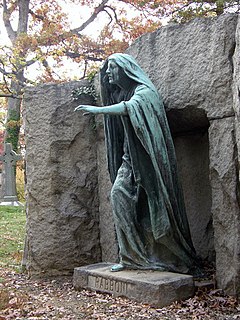
John 20:2 is the second verse of the twentieth chapter of the Gospel of John in the New Testament. Mary Magdalene has just discovered that the tomb of Jesus has been opened. In this verse she seeks out and tells this news to Peter and the "disciple whom Jesus loved".

Matthew 1:19 is the nineteenth verse of the first chapter in the Gospel of Matthew in the New Testament. It is part of the description of the events surrounding the birth of Jesus. Joseph has found Mary to be pregnant and in this verse considers leaving her.

Matthew 1:20 is the twentieth verse of the first chapter in the Gospel of Matthew in the New Testament. Previously Joseph had found Mary to be pregnant and had considered leaving her. In this verse an angel comes to him in a dream and reassures him.

Matthew 3 is the third chapter of the Gospel of Matthew in the New Testament. It is the first chapter dealing with the ministry of Jesus with events taking place some three decades after the close of the infancy narrative related in the previous two chapters. The focus of this chapter is on the preaching of John the Baptist and the Baptism of Jesus.
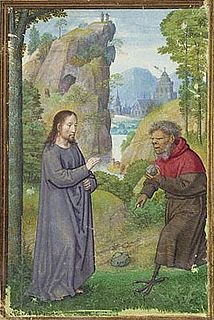
Matthew 4:3 is the third verse of the fourth chapter of the Gospel of Matthew in the New Testament. This verse opens the section in Matthew dealing with the temptation of Christ by Satan. Jesus has been fasting for forty days and forty nights and in this verse the devil gives Christ his first temptation and encourages him to use his powers to get food.
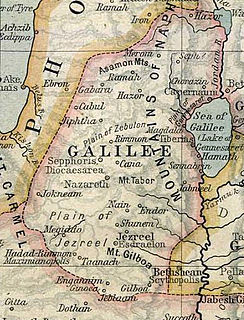
Matthew 4:14–15 are the fourteenth and fifteenth verses of the fourth chapter of the Gospel of Matthew in the New Testament. In the previous verses Jesus returned to Galilee after hearing of the arrest of John the Baptist and then left Nazareth for Capernaum. These introduce and then contain the first portion of a quote from the Book of Isaiah showing how these movements were preordained by scripture.

Matthew 5:1 and Matthew 5:2 are the first two verses of the fifth chapter of the Gospel of Matthew in the New Testament. The verses introduce the Sermon on the Mount that will be recited in the next several chapters. The previous verse mentioned the large crowds "from Galilee, and from the Decapolis, Jerusalem, Judea, and beyond the Jordan" who followed Jesus to witness him healing: these verses present Jesus as seeing the crowds and going up onto a mountain to begin teaching.

Matthew 5 is the fifth chapter of the Gospel of Matthew in the New Testament. It contains the first portion of the Sermon on the Mount, the other portions of which are contained in chapters 6 and 7. Portions are similar to the Sermon on the Plain in Luke 6, but much of the material is found only in Matthew. It is one of the most discussed and analyzed chapters of the New Testament. Warren Kissinger reports that among Early Christians no chapter was more often cited by early scholars. The same is true in modern scholarship.
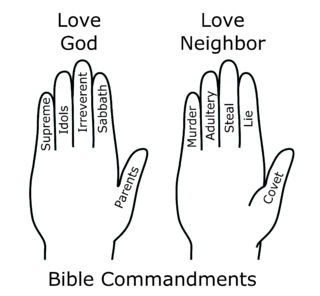
Matthew 5:30 is the thirtieth verse of the fifth chapter of the Gospel of Matthew in the New Testament and is part of the Sermon on the Mount. Part of the section on adultery, it is very similar to the previous verse, but with the hand mentioned instead of the eye. For a discussion of the radicalism of these verses see Matthew 5:29. Jesus had stated that looking at a woman in lust is equal to the act of adultery itself and in this verse he recommends cutting off one's hand to prevent sinning.

Matthew 5:32 is the thirty-second verse of the fifth chapter of the Gospel of Matthew in the New Testament and part of the Sermon on the Mount. This much scrutinized verse contains part of Jesus' teachings on the issue of divorce.

Matthew 5:33 is the thirty-third verse of the fifth chapter of the Gospel of Matthew in the New Testament and is part of the Sermon on the Mount. This verse is the opening of the fourth antithesis, beginning the discussion of oaths.

Matthew 23 is the twenty-third chapter in the Gospel of Matthew in the New Testament section of the Christian Bible and consists almost entirely of the accusations of Jesus against the Pharisees. The chapter is also known as the "Seven Woes" or Woes of the Pharisees. In this chapter, Jesus accuses the Pharisees of hypocrisy.

Matthew 28:1 is the first verse of the twenty-eighth chapter of the Gospel of Matthew in the New Testament. This verse opens the resurrection narrative as Mary Magdalene and "the other Mary" visit Jesus' tomb after the crucifixion.

Matthew 28:3 is the third verse of the twenty-eighth chapter of the Gospel of Matthew in the New Testament. This verse is part of the resurrection narrative and describes the angel who arrived at the tomb of Jesus in the previous verse.
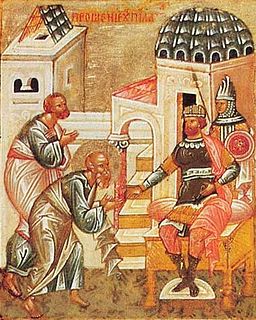
Matthew 27:58 is the fifty-eighth verse of the twenty-seventh chapter of the Gospel of Matthew in the New Testament. This verse describes Joseph of Arimathea meeting with Pontius Pilate to secure the burial of Jesus.

Matthew 7:29 is the twenty-ninth verse in the seventh chapter of the Gospel of Matthew in the New Testament. It ends a two verse conclusion following the Sermon on the Mount.

Matthew 10:1 is the first verse of the tenth chapter of the Gospel of Matthew in the New Testament. In this verse Jesus gathers his disciples and grants them healing powers in what is known as the commissioning the twelve apostles.
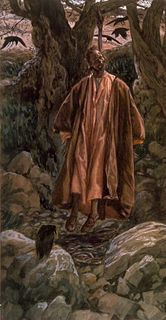
Matthew 27:5 is the fifth verse of the twenty-seventh chapter of the Gospel of Matthew in the New Testament. This verse continues the final story of Judas Iscariot. In the earlier verse Judas had regretted his decision to betray Jesus, but is met with disinterest from the Jewish leaders. In this verse his response is to return the blood money and then commit suicide.

Malachi 2 is the second chapter of the Book of Malachi in the Hebrew Bible or the Old Testament of the Christian Bible. This book contains the prophecies attributed to the prophet Malachi, and is a part of the Book of the Twelve Minor Prophets.




















